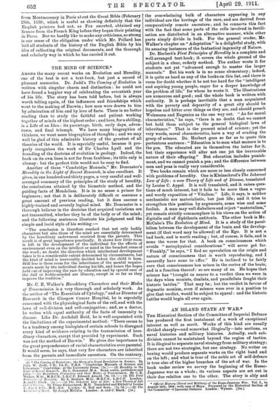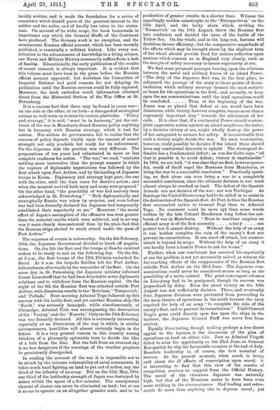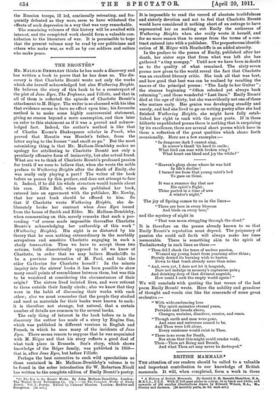AN ISLAND STATE AT WAR.* THE Historical Section of the
Committee of Imperial Defence has produced the first instalment of a work of exceptional interest as well as merit. Works of this kind are usually divided sharply—and somewhat illogically—into sections, as naval histories and military histories. Actually, such sub- division cannot be maintained beyond the region of tactics. It is illogical to separate naval strategy from military strategy; there are not two strategies, but one strategy. No_writer on boxing would produce separate works on the right hand and on the left ; and what is true of the noble art of self-defence is true also of the higher branches of the art of war. In the book under review we survey the beginning of the Russo- Japanese war as a whole ; its various aspects are set out in their due relation one to the other. The story is ably and
• Official History (Hard and Military) of the Russo-Japanese War. 'Yob L, to August 24th, 1004: with case of Maps. Prepared by the Historical Section of the Committe' "if J.vazerial Defence. London : Wyman. [15s.)
lucidly written, and is made the foundation for a series of comments which should prove of the greatest interest to the soldier and the sailor, and of hardly less value to the states- man. On account of its wider scope, the book transcends in importance any which the General Staffs of the Continent have produced. The German work is no exception, and the monumental Russian official account, which has been recently published, is essentially a military. history. Like every con- tribution to the advancement of knowledge in a living science, oar Naval and Military History necessarily suffers from a lack of finality. Educationally, the early publication of the results of recent research is always important. It is evident that this volume must have been in the press before the Russian official account appeared; but doubtless the Committee of Imperial Defence had good reasons for not delaying its publication until the Russian sources could be fully explored. Moreover, the book embodies much information obtained direct from the Historical Section of the War Office at St. Petersburg.
It is a curious fact that there may be found in every war— on one aide or the other, or on both—a disregard of strategical axioms so well-worn as to seem the veriest platitudes. "Policy and strategy," it is said, "must he in harmony," yet the out- break of the war in Manchuria found Russian policy anything but in harmony with Russian strategy, which it had far outrun. Not seldom do governments fail to realise that the success of policy depends wholly upon the amount of armed strength not only available but ready for its enforcement. On the Japanese side the position was very different. The preparations of ten years had culminated in more or less complete readiness for action. "The war," we read, "contains nothing more instructive than the prompt manner in which the rupture of diplomatic negotiations was followed by the first attack upon Port Arthur, and by the landing of Japanese troops in Korea. Diplomacy and strategy kept pace, the one with the other, until the time came for decisive action ; and when the moment arrived both navy and army were prepared." On the other hand, "the possibility of war had scarcely been acknowledged in St. Petersburg." " Both diplomatically and strategically Russia was taken by surprise, and even before war had been formally declared the Japanese had temporarily established their superiority at sea." Moreover, "the moral effect of Japan's assumption of the offensive was even greater than the material results which were achieved, and in no way was it more clearly demonstrated than by the plain fact that the Russian ships elected to await attack under the guns of Port Arthur."
The sequence of events is noteworthy. On the 4th February, 1904, the Japanese Government decided to break off negotia- tions. On the 5th the fleet and the troops at Sasebo received orders to be ready to sail on the following day. On the 6th, at 2 a.m., the first troops of the 12th Division embarked for Seoul. At 9 a.m. the torpedo flotillas left for Port Arthur, followed soon afterwards by the remainder of the fleet. On the same day, in St. Petersburg, the Japanese minister informed Count Lamsdorff that he had been directed to sever diplomatic relations and to withdraw from the Russian capital. On the night of the 8th the Russian fleet was attacked outside Port Arthur, with disastrous results to the • Retvizan," Tzesarevich; and Pallada.' Next morning Admiral Togo followed up this success with his battle-fleet, and yet another Russian ship, the ' Novik,' was seriously damaged; while simultaneously, at Chemulpo, Admiral Uriu was encompassing the destruction of the Varyag ' and the Koreetz.' Only on the 10th February was war formally declared. All this is extremely interesting, especially as an illustration of the way in which, in similar circumstances, hostilities will almost certainly begin in the future. It is a very general custom in this country among thinkers of a pleasantly optimistic turn to deride the idea of a bolt from the blue. But the bolt from an overcast sky is no less dangerous if the warnings of the weather prophets be persistently disregarded.
In reading the account of the war it is impossible not to be struck by the extreme vulnerability of naval armaments. It takes much hard fighting on land to put out of action, say, one third of the infantry of an army. But on the 15th May,1901, one third of the battleship strength of Japan was destroyed by mines within the space of a few minutes. The omnipresent element of chance can never be eliminated on land ; but at sea it seems to operate on an altogether grander scale, and to be productive of greater results in a shorter time. Witness the appallingly sudden catastrophe to the 'Petropavlovsk ' on the 13th April, and the lucky shots which, striking the Tzesarevich ' on the 10th August, threw the Russian fleet into confusion and decided the issue of the battle of the Yellow Sea. On the whole, and in the long run, fortune will doubtless favour efficiency ; but the comparative magnitude of the effects which may be brought about by the slightest turn of her wheel should provide food for serious reflection upon matters which concern us in England very closely, such as the margin of safety necessary to insure superiority at sea.
We find some pregnant passages bearing upon the relations between the naval and military forces of an island Power. " The duty of the Japanese fleet was, in the first place, to safeguard the passage of the army to those points of disem- barkation which military strategy deemed the most suitable as bases for the operations in the field; and, secondly, to keep open the sea communications until the land operations could be concluded Thus, at the beginning of the war, Japan was so placed that defeat at sea would have been disastrous, while victory, however complete, was no more than a supremely important step" towards the attainment of her ends. It is clear that, if a continental Power should contem- plate aggressive action against an island neighbour, the latter, by a decisive victory at sea, might wholly destroy the power of her antagonist to menace her safety. It is conceivable that such a victory might decide the war. No such termination, however, could possibly be decisive if the island State should have any continental interests to uphold. The strategical de- fensive has a fundamental defect ; as von der Goltz says, "all that is possible is to avoid defeat ; victory is unattainable." In 1904, we are told, " it was clear that no fleet, however power- ful, could of itself expel the Russians from Manchuria, or bring the war to a successful conclusion." Practically speak- ing, no fleet alone can ever bring a war to a completely successful conclusion, since the ultimate decision in war must almost always be reached on land. The defeat of the Spanish Armada was not decisive of the war; nor was Trafalgar. At Santiago the United States army had to be called in to assist in the destruction of the Spanish fleet. At Port Arthur the Russian fleet succumbed rather to General Nogi than to Admiral Togo. No comment could be more apt than some words written by the late Colonel Henderson long before the out- break of war in Manchuria. " Even to maritime empires an efficient army is of the first necessity . . . . a navy . . . . can protect but it cannot destroy. Without the help of an army it can neither complete the ruin of the enemy's fleet nor prevent its resuscitation. It can ward of attack, but counter- attack is beyond its scope. Without the help of an army it can hardly force a hostile Power to ask for terms."
Further, when one combatant has asserted his superiority at sea the problem is not yet necessarily solved, as witness the far-reaching effects of the reappearance of the Russian fleet outside Port Arthur on the 23rd June. The Japanese com- munications could never be considered secure so long as the possibility of a sortie existed. The great convergent advance on Liao-yang had to be postponed, though its success was jeopardised by delay. Even the naval victory on the 10th August was not sufficiently decisive. Three, and eventually four, Japanese divisions were prevented from proceeding to the main theatre of operations in the north because the navy required the help of an army "to complete the ruin of the enemy's fleet, and to prevent its resuscitation." Until General Nogi's guns could directly open fire upon the ships in the harbour, the Japanese General Staff was never free from anxiety.
Equally illuminating, though making perhaps a less direct appeal to the layman, is the discussion of the plan of operations on land on either side. Just as Admiral Vitgeft failed to seize his opportunity on the 23rd June, so General Kuropatkin let slip the favourable occasion at the end of July. Resolute leadership is, of course, the first essential of success. At the present moment, when much is being said about the ill effects of conscription upon moral, it is interesting to find that this view of the results of compulsion receives no support from the Official History. The moral of the victorious Japanese was naturally high, but that of the Russians seems to have been even more striking in the circumstances. Bad leading and retire- ments do more than anything else to depress moral ; yet the Russian troops, ill led, continually retreating, and fre- quently defeated as they were, seem to have withstood the effects of such depression in a way that was very remarkable.
The remaining volumes of this history will be awaited with interest, and the completed work should form a valuable con- tribution to the literature of war. It is permissible to hope that the present volume may be read by our politicians and others who make war, as well as by our soldiers and sailors who make peace.




























































 Previous page
Previous page